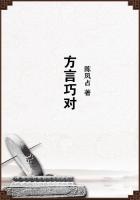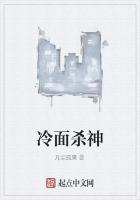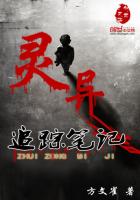And Bertha turned a deaf ear to everything. The desolation was so great that she found the drawbridge lowered, and hastened to quit the castle, fearing that it might be suddenly raised again; but no one had the right or the heart to do it. She sat down on the curb of the moat, in view of the whole castle, who begged her, with tears, to stay. The poor sire was standing with his hand upon the chain of the portcullis, as silent as the stone saints carved above the door. He saw Bertha order her son to shake the dust from his shoes at the end of the bridge, in order to have nothing belonging to Bastarnay about him; and she did likewise. Then, indicating the sire to her son with her finger, she spoke to him as follows--"Child, behold the murderer of thy father, who was, as thou art aware, the poor prior; but thou hast taken the name of this man. Give it him back here, even as thou leavest the dust taken by the shoes from his castle. For the food that thou hast had in the castle, by God's help we will also settle."
Hearing this, Bastarnay would have let his wife receive a whole monastery of monks in order not to be abandoned by her, and by a young squire capable of becoming the honour of his house, and remained with his head sunk down against the chains.
The heart of Bertha was suddenly filled with holy solace, for the banner of the great monastery turned the corner of a road across the fields, and appeared accompanied by the chants of the Church, which burst forth like heavenly music. The monks, informed of the murder perpetrated on their well-beloved prior, came in procession, assisted by the ecclesiastical justice, to claim his body. When he saw this, the Sire de Bastarnay had barely that time to make for the postern with his men, and set out towards Monseigneur Louis, leaving everything in confusion.
Poor Bertha, en croup behind her son, came to Montbazon to bid her father farewell, telling him that this blow would be her death, and was consoled by those of her family who endeavoured to raise her spirits, but were unable to do so. The old Sire de Rohan presented his grandson with a splendid suit of armour, telling him to acquire glory and honour that he might turn his mother's faults into eternal renown.
But Madame de Bastarnay had implanted in the mind of her dear son no other idea than of atoning for the harm done, in order to save her and Jehan from eternal damnation. Both then set out for the places then in a state of rebellion, in order to render such service to Bastarnay that he would receive from them more than life itself.
Now the heat of the sedition was, as everyone knows, in the neighbourhood of Angouleme, and of Bordeaux in Guienne, and other parts of the kingdom, where great battles and severe conflicts between the rebels and the royal armies was likely to take place. The principal one which finished the war was given between Ruffec and Angouleme, where all the prisoners taken were tried and hanged. This battle, commanded by old Bastarnay, took place in the month of November, seven months after the poisoning of Jehan. Now the Baron knew that his head had been strongly recommended as one to be cut off, he being the right hand of Monsiegneur Louis. Directly his men began to fall back, the old fellow found himself surrounded by six men determined to seize him. Then he understood that they wished to take him alive, in order to proceed against his house, ruin his name, and confiscate his property. The poor sire preferred rather to die and save his family, and present the domains to his son. He defended himself like the brave old lion that he was. In spite of their number, these said soldiers, seeing three of their comrades fall, were obliged to attack Bastarnay at the risk of killing him, and threw themselves together upon him, after having laid low two of his equerries and a page.
In this extreme danger an esquire wearing the arms of Rohan, fell upon the assailants like a thunderbolt, and killed two of them, crying, "God save the Bastarnays!" The third man-at-arms, who had already seized old Bastarnay, was so hard pressed by this squire, that he was obliged to leave the elder and turn against the younger, to whom he gave a thrust with his dagger through a flaw in his armour. Bastarnay was too good a comrade to fly without assisting the liberator of his house, who was badly wounded. With a blow of his mace he killed the man-at-arms, seized the squire, lifted him on to his horse, and gained the open, accompanied by a guide, who led him to the castle of Roche-Foucauld, which he entered by night, and found in the great room Bertha de Rohan, who had arranged this retreat for him. But on removing the helmet of his rescuer, he recognised the son of Jehan, who expired upon the table, as by a final effort he kissed his mother, and saying in a loud voice to her--"Mother, we have paid the debt we owed him!"
Hearing these words, the mother clasped the body of her loved child to her heart, and separated from him never again, for she died of grief, without hearing or heeding the pardon and repentance of Bastarnay.
The strange calamity hastened the last day of the poor old man, who did not live to see the coronation of King Louis the Eleventh. He founded a daily mass in the Church of Roche-Foucauld, where in the same grave he placed mother and son, with a large tombstone, upon which their lives are much honoured in the Latin language.
The morals which any one can deduce from this history are the most profitable for the conduct of life, since this shows how gentlemen should be courteous with the dearly beloveds of their wives. Further, it teaches us that all children are blessings sent by God Himself, and over them fathers, whether true or false, have no right of murder, as was formerly the case at Rome, owing to a heathen and abominable law, which ill became that Christianity which makes us all sons of God.














